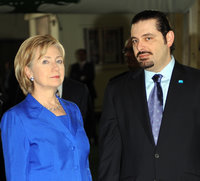BEIRUT, Lebanon -- Following a landmark election on Sunday, the U.S.-backed "March 14" coalition held on to its slim majority in the Lebanese parliament, defeating the opposition alliance of Hezbollah, Amal, and the Free Patriotic Movement (FPM), an officially secular but mostly Christian party headed by General Michel Aoun.
Analysts are scrutinizing the returns in an effort to explain how March 14 managed to pull off a decisive win, given that extensive polling over a period of months had suggested a much closer race with a greater likelihood of an opposition victory.
Coming as it did on the heels of several visits by various high-level U.S. envoys to Beirut over the past few weeks -- including Secretary of State Hillary Clinton and Vice President Joe Biden -- the election result is being chalked up by some observers as a triumph for the Obama administration's Middle East policy. They argue that the persistent warnings of a drastic change in U.S. support for Lebanon in the event of a "Hezbollah victory" seem to have borne fruit.

